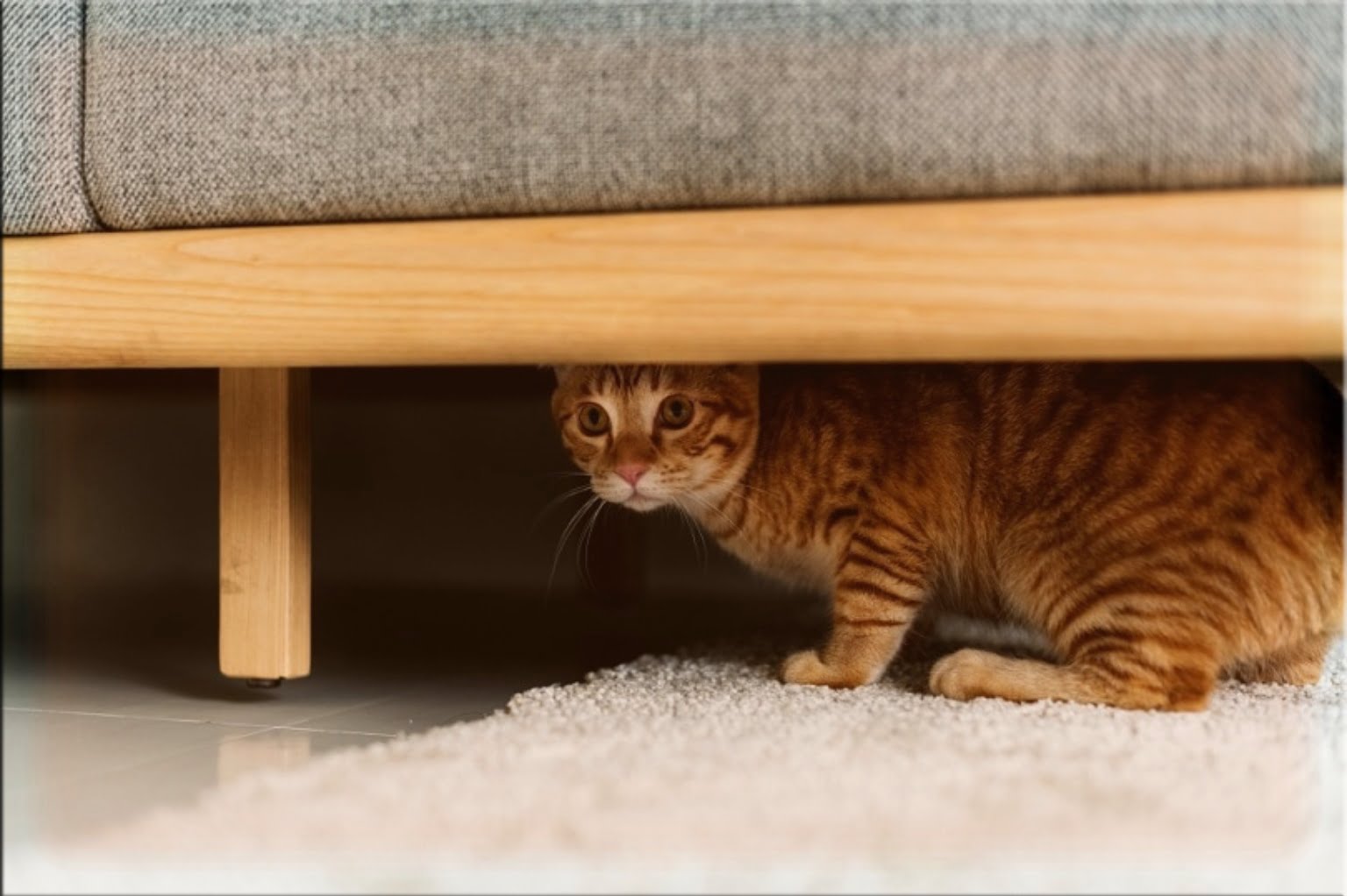Numerous pet owners express concern when their previously affectionate cat suddenly starts to avoid them, leading to the pressing question – why my cat wants to be alone all of a sudden?
Why my cat wants to be alone all of a sudden?
- Remember that cats don’t respond well to loud voices or physical reprimands, even if the intention behind the action is good. These charming creatures prefer affection and treats, regardless of their occasional misbehavior.
- Even unintentional offenses can lead to them harboring resentment for extended periods, unless you genuinely apologize.
- To prevent your feline friend from becoming distant, avoid punishments that could potentially strengthen negative behaviors.
- Their moodiness could also stem from previous traumatic experiences or a difficult past, particularly for rescue cats. This emphasizes the need to thoroughly understand a cat’s social and medical background before bringing them into your home. A Change in Routine Cats, like many other animals, are creatures of habit. Even minor alterations in their daily routine can unsettle them. This could involve moving houses, modifying the cat’s diet, introducing a new pet into the house, or redecorating the home.
- They’re resting cats, being playful creatures, need substantial playtime to expend their energy. However, before initiating playtime with your cat, ensure it is in the mood.
- Pets, despite being active and playful, prefer interacting on their own terms.
- If your cat shows no interest when you invite it to play, it’s likely that it’s enjoying some downtime and doesn’t want to be disturbed.
- Respecting its space and providing ample relaxation time will make your feline friend more inclined to engage with you when it’s ready for playtime.
- Sensory decline a common reason for your cat’s seeming indifference could be a sudden or gradual loss in its sensory abilities.
- Many cats, as they age, suffer from vision loss, leading them to withdraw from their usual playful behaviors.
- Hearing loss in cats can also result in unusual reactions to being stroked or cuddled.
Another reasons for why my cat wants to be alone all of a sudden
Presence of other cats in the vicinity
Cats are notably territorial creatures and may not take kindly to other cats invading their space, depending on their breed.
If a neighboring cat happens to mark its territory close to your cat’s area, it’s reasonable to expect your feline companion to become upset, particularly if it’s unable to find the trespassing cat to confront it.
Such minor invasions could cause an otherwise outgoing cat to become withdrawn. Keep an eye out for scratch marks on outdoor posts and other surfaces as signs of intrusion. If you suspect your cat feels invaded, consider using synthetic cat pheromones on outdoor structures to help ease your cat’s anxiety.
Also discover: Black Maine Coon
Potential health issues
Medical conditions that result in pain or fatigue may cause your cat to lose interest in interacting with you.
Typically, cats choose to isolate themselves when they’re unwell. Additionally, as they lack the means to express their discomfort, they rely on their owners to identify any issues.
If a hidden health issue is causing your cat to keep its distance, monitor for significant changes in its eating or drinking behaviors. Observe if your cat is using its litter box normally, and pay attention to any alterations in its vocal sounds.
Determine if your cat is social with this test
Why my cat wants to be alone all of a sudden?
You may have often questioned whether your cat leans towards being an introvert. The good news is that you can easily discover this by answering the questions in the following test.
Test 1: Is your cat unsociable?
If you’re a cat owner, you’re likely to be familiar with your pet’s likes, dislikes, and the amount of time it enjoys spending with you. Traditionally, cats have been considered more asocial than dogs, often relishing their personal space and solitude.
However, some experts argue that cats are indeed humanity’s best friends. If you’re curious to know whether your feline falls into the asocial category, consider these straightforward questions.
Test 2: Is your cat unsociable?
The test consists of three simple questions that will help you determine whether your cat is unsociable.
Question 1: Does your cat recognize its name?
To discern whether your cat takes an interest in you, it’s crucial to ascertain if it knows its name. You can test this by uttering words similar to your cat’s name using the same tone, then call its name. If your cat turns to you, moves its ears, or tail only when you say its name, it suggests that your cat recognizes it.
Question 2: Does your cat show empathy towards you?
You can gauge your cat’s empathy level by sharing a room with it and an object that scares it, for instance, a vacuum cleaner. Proceed to praise the object. If your cat is calmed enough to approach the vacuum cleaner, it indicates that your cat trusts you.
Question 3: Is your cat independent?
To understand your cat’s independence level, spend some time in a room with it. Initially, ignore it, then try interacting by calling its name. If it turns and approaches you, show it affection and speak to it. This would suggest that your cat is sociable. On the contrary, if your cat doesn’t respond, it suggests a high level of independence. In such cases, we recommend spending more time playing and talking with your cat.
How can you alleviate your cat’s loneliness?
Cat owners often mitigate their pet’s loneliness by dedicating extra time for individual attention, arranging for a neighbor to visit during their absence, or enhancing the indoor surroundings to make them more engaging and appealing. All of these are excellent strategies that would undoubtedly bring some joy to any cat, but there’s another alternative you may not have considered: adopting an additional cat!
It’s reasonable to assume that solitary cats are more susceptible to loneliness than those that cohabit with a feline companion. Since June is recognized as national Adopt-a-Cat Month, it’s the ideal time to introduce a new feline member to your household. By doing so, not only will you provide a consistent buddy and a more fulfilling life for your cat, but you’ll also be rescuing the life of the shelter cat you welcome into your home!
How can you recognize if your cat is lonely?
Over-Grooming
Cats that are lonely often over-groom or even pluck out their fur. While cats are inherently fastidious groomers, if your cat’s grooming habits seem to be bordering on the obsessive-compulsive, this might be an indication of loneliness.
Increased Vocalization
While some cats are naturally chatty, if your usually silent feline suddenly starts vocalizing excessively, this might be a plea for additional interaction. Loud, persistent vocalization could also suggest that loneliness is a concern.
Problems with Litter Box Use
In instances where your cat starts urinating or defecating outside the litter box, it’s crucial to first eliminate any potential medical causes, as this could be a sign of kidney or urinary tract issues. However, if your cat is given a clean bill of health and continues this behavior, it might be a sign of dissatisfaction stemming from loneliness. This is particularly likely if you find your cat eliminating on items that carry your scent, like bedding or clothes.
Aggression
Cats that are lonely may exhibit aggressive behavior, especially when they notice their owner preparing to leave. If your cat starts showing hostility as you’re about to depart, it’s not a sign they want you gone – rather, it’s their way of communicating a desire for more companionship.
Destructive Actions
Lonely cats, often bored, can come up with incredibly imaginative (and damaging) activities to keep themselves occupied. Cats may move or ruin objects in an attempt to stay engaged while you’re gone. Whether your cat has taken to demolishing your couch, climbing your curtains, or tearing up your toilet paper, such destructive behavior is likely a sign of idle paws seeking an outlet.












